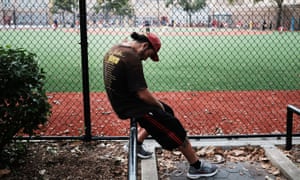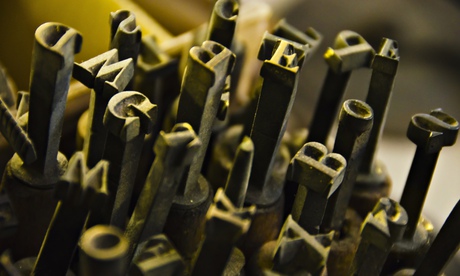Chris McGreal in The Guardian
 ‘Opioids killed more than 33,000 Americans in 2015 and the toll was almost certainly higher last year.’
‘Opioids killed more than 33,000 Americans in 2015 and the toll was almost certainly higher last year.’
Of all the people Donald Trump could blame for the opioid epidemic, he chose the victims. After his own commission on the opioid crisis issued an interim report this week, Trump said young people should be told drugs are “No good, really bad for you in every way.”
The president’s exhortation to follow Nancy Reagan’s miserably inadequate advice and Just Say No to drugs is far from useful. The then first lady made not a jot of difference to the crack epidemic in the 1980s. But Trump’s characterisation of the source of the opioid crisis was more disturbing. “The best way to prevent drug addiction and overdose is to prevent people from abusing drugs in the first place,” he said.
That is straight out of the opioid manufacturers’ playbook. Facing a raft of lawsuits and a threat to their profits, pharmaceutical companies are pushing the line that the epidemic stems not from the wholesale prescribing of powerful painkillers - essentially heroin in pill form - but their misuse by some of those who then become addicted.
The amount of opioids prescribed in the US was enough for every American to be medicated 24/7 for three weeks”
In court filings, drug companies are smearing the estimated two million people hooked on their products as criminals to blame for their own addiction. Some of those in its grip break the law by buying drugs on the black market or switch to heroin. But too often that addiction began by following the advice of a doctor who, in turn, was following the drug manufacturers instructions.
Trump made no mention of this or reining in the mass prescribing underpinning the epidemic. Instead he played to the abuse narrative when he painted the crisis as a law and order issue, and criticised Barack Obama for scaling back drug prosecutions and lowering sentences.
But as the president’s own commission noted, this is not an epidemic caused by those caught in its grasp. “We have an enormous problem that is often not beginning on street corners; it is starting in doctor’s offices and hospitals in every state in our nation,” it said.
The president’s exhortation to follow Nancy Reagan’s miserably inadequate advice and Just Say No to drugs is far from useful. The then first lady made not a jot of difference to the crack epidemic in the 1980s. But Trump’s characterisation of the source of the opioid crisis was more disturbing. “The best way to prevent drug addiction and overdose is to prevent people from abusing drugs in the first place,” he said.
That is straight out of the opioid manufacturers’ playbook. Facing a raft of lawsuits and a threat to their profits, pharmaceutical companies are pushing the line that the epidemic stems not from the wholesale prescribing of powerful painkillers - essentially heroin in pill form - but their misuse by some of those who then become addicted.
The amount of opioids prescribed in the US was enough for every American to be medicated 24/7 for three weeks”
In court filings, drug companies are smearing the estimated two million people hooked on their products as criminals to blame for their own addiction. Some of those in its grip break the law by buying drugs on the black market or switch to heroin. But too often that addiction began by following the advice of a doctor who, in turn, was following the drug manufacturers instructions.
Trump made no mention of this or reining in the mass prescribing underpinning the epidemic. Instead he played to the abuse narrative when he painted the crisis as a law and order issue, and criticised Barack Obama for scaling back drug prosecutions and lowering sentences.
But as the president’s own commission noted, this is not an epidemic caused by those caught in its grasp. “We have an enormous problem that is often not beginning on street corners; it is starting in doctor’s offices and hospitals in every state in our nation,” it said.

‘This is an almost uniquely American crisis.’
Opioids killed more than 33,000 Americans in 2015 and the toll was almost certainly higher last year. About half of deaths involved prescription painkillers. Most of those who overdose on heroin or a synthetic opiate, such as fentanyl, first become hooked on legal pills.
This is an almost uniquely American crisis driven in good part by particular American issues from the influence of drug companies over medical policy to a “pill for every ill” culture. Trump’s commission, which called the opioid epidemic “unparalleled”, said the grim reality is that “the amount of opioids prescribed in the US was enough for every American to be medicated around the clock for three weeks”.
The US consumes more than 80% of the global opioid pill production even though it has less than 5% of the world’s population. Over the past 20 years, one federal institution after another lined up behind the drug manufacturers’ false claims of an epidemic of untreated pain in the US. They seem not to have asked why no other country was apparently suffering from such an epidemic or plying opioids to its patients at every opportunity.
With the pharmaceutical lobby’s money keeping Congress on its side, regulations were rewritten to permit physicians to prescribe as many pills as they wanted without censure. Indeed, doctors sometimes found themselves hauled before ethics boards for not supplying enough.
It’s an epidemic because we have a business model for it. Follow the money
Unlike most other countries, the US health system is run as an industry not a service. That gives considerable power to drug manufacturers, medical providers and health insurance companies to influence policy and practices.
Too often, their bottom line is profits not health. Opioid pills are far cheaper and easier than providing other forms of treatment for pain, like physical therapy or psychiatry. As Senator Joe Manchin of West Virginia told the Guardian last year: “It’s an epidemic because we have a business model for it. Follow the money. Look at the amount of pills they shipped in to certain parts of our state. It was a business model.”
But the system also gives a lot of power to patients. People coughing up large amounts of money in insurance premiums and co-pays expect results. They are, after all, more customer than patient. Doctors complain of patients who arrive expecting a pill to resolve medical conditions without taking responsibility for their own health by eating better or exercising more.
In particular, the idea has taken hold, pushed by the pharmaceutical industry, that there is a right to be pain free. Other countries pursue strategies to reduce and manage pain, not raise expectations that it can simply be made to disappear. In all of this, regulators became facilitators. The Food and Drug Administration approved one opioid pill after another.
The Food and Drug Administration approved one opioid pill after another.
As late as 2013, by which time the scale of the epidemic was clear, the FDA permitted a powerful opiate, Zohydro, onto the market over the near unanimous objection of its own review committee. It was clear from the hearing that doctors understood the dangers, but the agency appeared to have put commercial considerations first.
US states long ago woke up to the crisis as morgues filled, social services struggled to cope with children orphaned or taken into care, and the epidemic took an economic toll. Police chiefs and local politicians said it was a social crisis not a law and order problem.
Some state legislatures began to curb mass prescribing. All the while they looked to Washington for leadership. They did not get much from Obama or Congress, although legislation approving $1bn on addiction treatment did pass last year. Instead, it was up to pockets of sanity to push back.
Last year, the then director of the Centers for Disease Control, Tom Frieden, made his mark with guidelines urging doctors not to prescribe opioids as a first step for chronic or routine pain, although even that got political pushback in Congress where the power of the pharmaceutical lobby is not greatly diminished.
There are also signs of a shift in the FDA after it pressured a manufacturer into withdrawing an opioid drug, Opana, that should never have been on sale in the first place. It was initially withdrawn in the 1970s, but the FDA permitted it back on to the market in 2006 after the rules for testing drugs were changed. At the time, many accused the pharmaceutical companies of paying to have them rewritten.
Trump’s opioid commission offered hope that the epidemic would finally get the attention it needs. It made a series of sensible if limited recommendations: more mental health treatment people with a substance abuse disorder and more effective forms of rehab.
Trump finally got around to saying that the epidemic is a national emergency on Thursday after he was criticised for ignoring his own commission’s recommendation to do so. But he reinforced the idea that the victims are to blame with an offhand reference to LSD.
Real leadership is still absent – and that won’t displease the pharmaceutical companies at all.

